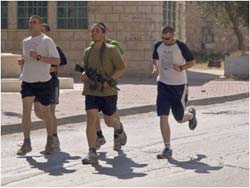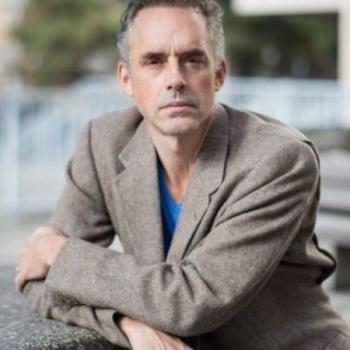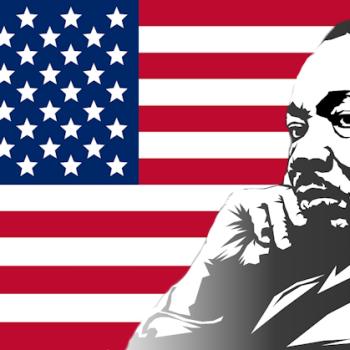She fears Jewish settlers, feels constantly harassed and under siege. Yet at the same time, she occasionally talks to settler leaders and daydreams of more normal relations. "Not all of them are bad," she says. "There is a possibility to talk to some of them." Later on she muses, "I'm wondering if I can persuade the settlers to play soccer with us."
A blue Israeli bus pulls up to the curb at the other end of Shuhada Street. "You know how you can tell it's bulletproof?" says Yossi Baumol. "The driver's window doesn't open."
 Three days a week during the summer, Hebron's Jews offer a bus trip from Jerusalem to the settler enclave. As their website puts it, it's a chance to "celebrate Jewish history with those making it!" I've decided to tag along one morning to see what normal life is like for the people behind the Jewish revolution there.
Three days a week during the summer, Hebron's Jews offer a bus trip from Jerusalem to the settler enclave. As their website puts it, it's a chance to "celebrate Jewish history with those making it!" I've decided to tag along one morning to see what normal life is like for the people behind the Jewish revolution there.
Baumol, our guide, is executive director of the New York-based Hebron Fund, which raises money to support the settler community. He's a chunky, balding, middle-aged man whose knitted kippah offers little protection from the harsh summer sun. We were barely on the road when he launched a stream-of-consciousness monologue that praised Jews, denigrated Arabs, and detected the hand of God in the passing scenery. Now, as we walk to the top of Tel Rumeida, one of the tourists asks why the area seems so empty of people. "The Arabs have deserted the area just like blacks abandoned Watts after the riots," Baumol replies. "They damaged themselves."
Baumol minimizes the Goldstein massacre as "the unfortunate single act of terror by a Jew" but prefers to focus on the killings of Jews. In fact, a brochure published by the settlers includes a timeline of hostilities that details each Jewish death over the years, but the date of the massacre is marked only with the line: "Hamas plans major terror attack against Jews in Hebron." This oblique reference reflects the rationale that Goldstein's defenders usually offer: that his homicidal rampage in the mosque preempted an Arab terrorist attack.
Baumol turns the proceedings over to Simcha Hochbaum, a New York-born rabbi who has lived in Hebron for twelve years with his wife and five children. Hochbaum's clothes are casual -- a tan knit shirt and slacks -- but his message is impassioned. He speaks in the rhythmic cadences of a polite but emphatic yeshiva boy. "We're walking today in the footsteps of our forefathers," he tells the group. "Avraham Avinu at age 127 bought the Cave of the Patriarchs for 400 pieces of silver. How can you not live here? This is where our history begins. Not on Delancey Street, but here."
Hochbaum's presentation veers from the sacred to the mundane. One minute he's enthralling the crowd with tales of Abraham; the next he's boasting that the supermarket in the nearby settlement of Kiryat Arba delivers groceries here five times daily. The settlers do not lack for Ben and Jerry's, he assures us.
He takes us into the Beit Hadassah compound. There are various small apartments clustered around a courtyard and tucked behind tall stone walls and chain-link fences topped with razor wire. Small children careen through the playground and mini-basketball court. All in all, says Hochbaum, thirty-five families live here. The centerpiece is a three-story building with apartments and, on the ground floor, one of the seminal parts of the Hebron legend, the Hebron Martyrs Museum, which memorializes the victims of the 1929 massacre. "Seventy-eight years ago the Jews believed that here they would be safe. The Arabs murdered us, killed us and raped us here in this very building. They came and they ransacked and desecrated the cemetery. And they're still trying to destroy us."
Hochbaum escorts us down Shuhada Street and through an abandoned Arab market to the apartment of the Bar Kochbas, one of two families that moved into two of the Arab shops that have been vacant for the past thirteen years under Israeli army orders. When they heard the families had moved in, the Palestinian shopkeepers approached the Israeli activist group Peace Now, which filed a complaint with the Israeli Civil Administration seeking an eviction order. After months of legal arguments, the government has ordered the families to leave. "Massacres, shootings and suicide bombings -- they don't succeed in driving us out," Hochbaum tells us, "and I can promise you the politicians won't succeed, either."
He leads us in prayer. "Close the mouths of those who are trying to persecute us," he pleads to God.




